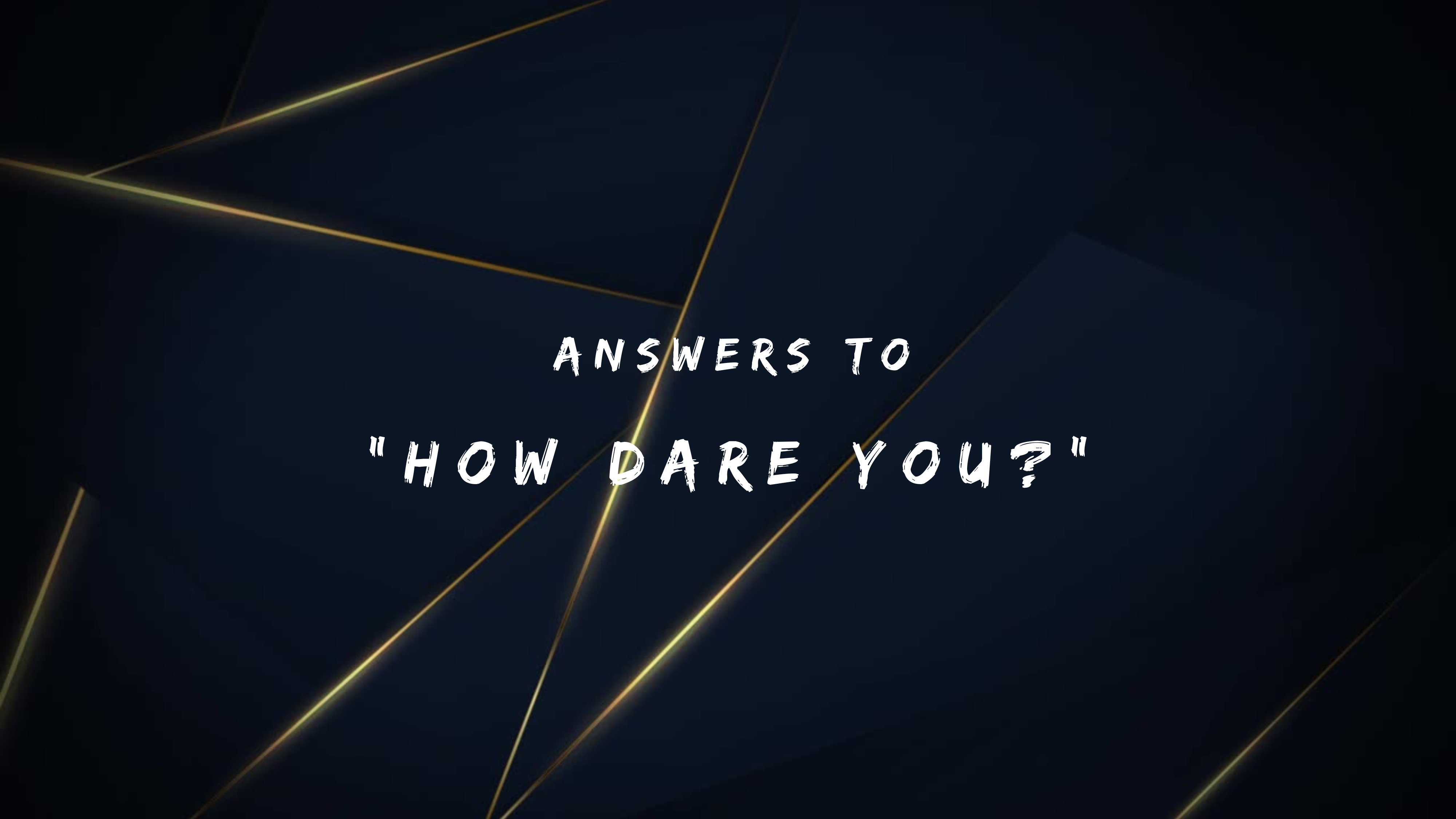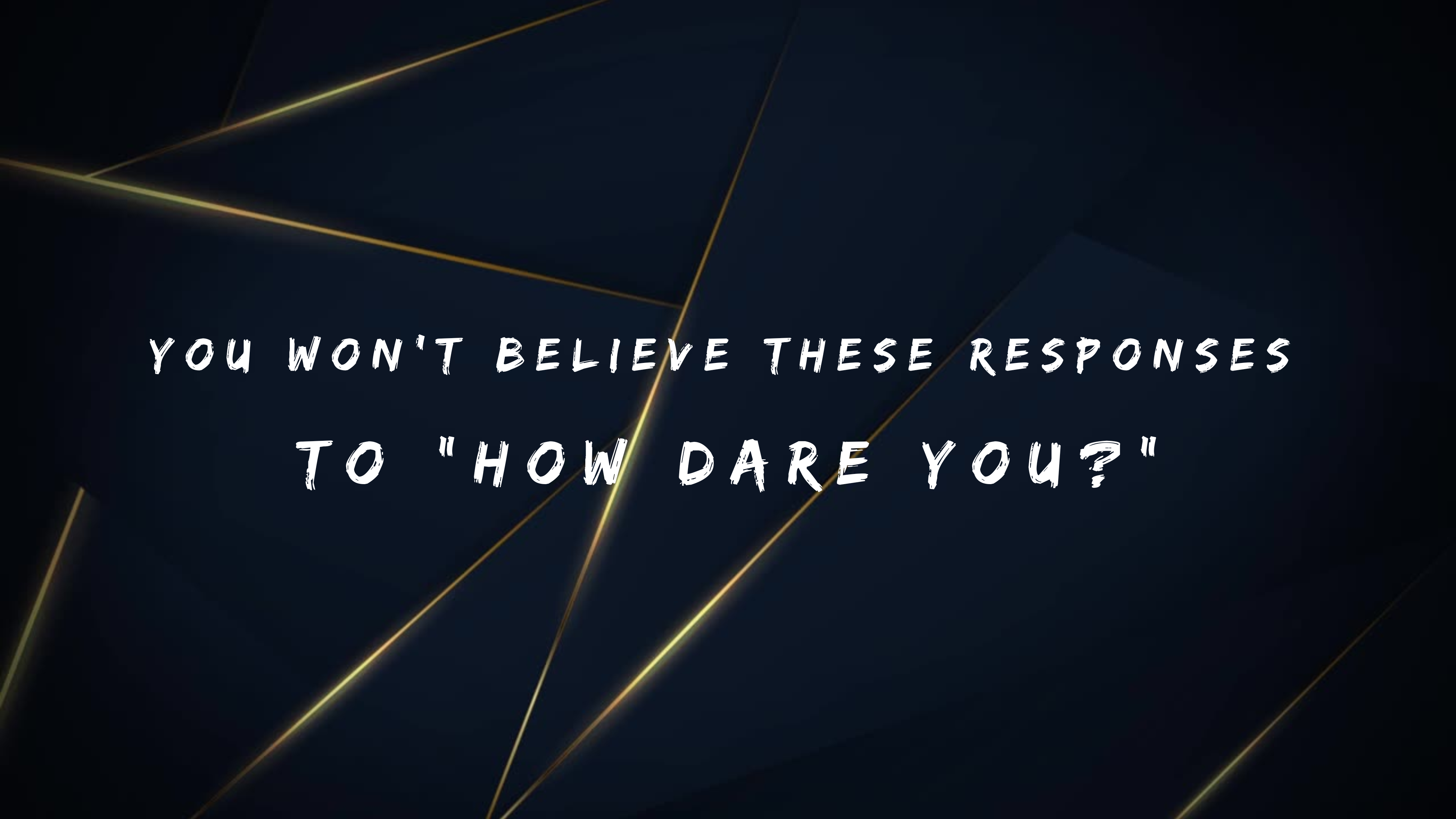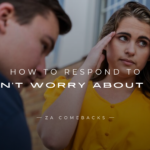Have you ever been caught in a conversation where someone threw out the phrase, “How dare you?” It’s one of those phrases that can instantly change the vibe of a discussion. Depending on the context, you might feel a pang of guilt, or perhaps you find it humorous. Understanding the nuances behind “How dare you?” is crucial for effective communication. In this article, we’ll explore what the phrase means, its emotional baggage, and how to respond when faced with it.

150+ Answers To “How Dare You?”
Defensive Responses
- I dared because I have a right to my opinion.
- It’s my responsibility to speak up.
- I didn’t mean to offend; I was just being honest.
- My actions were based on careful consideration.
- I’m not afraid to express what I believe.
- It was necessary to bring this to light.
- I believe in advocating for what’s right.
- Sometimes, silence is collaboration, and I won’t stand for that.
- You may not agree, but I have my reasons.
- I dare because I believe it’s the right thing to do.
Assertive Responses
- Because I refuse to stay silent.
- I dare to challenge norms that need changing.
- I dare because my voice matters.
- I’m not afraid to stand up for what I believe in.
- I dare because it’s my right.
- I must advocate for those who can’t.
- I dare to inspire others to take action.
- I believe in my right to express myself.
- I dare because I know I can make a difference.
- I’ll continue to speak up, no matter the consequences.
Humorous Responses
- How dare I? Well, someone has to be the brave one!
- I dared because I was feeling adventurous!
- How dare I? I forgot my manners!
- I dare because it’s a thrill, like bungee jumping without a cord!
- How dare I? I like living life on the edge!
- Because being a rebel is my side job!
- I dare because I live for the dramatic moments!
- How dare I? I wanted to spice things up!
- I thought it was ‘dare’ week—didn’t you get the memo?
- How dare I? I just wanted to add a little drama!
Philosophical Responses
- Isn’t it our duty to question the status quo?
- To dare is to live fully; otherwise, we are merely existing.
- Every great change begins with someone daring to speak out.
- How can we grow if we don’t dare to challenge ourselves?
- Daring is what leads to progress and understanding.
- I dare to explore the uncomfortable truths of our reality.
- In a world full of silence, daring is a revolutionary act.
- Without daring, humanity would stagnate.
- To dare is to embrace the uncertainty of life.
- Daring opens the door to meaningful conversations.
Empathetic Responses
- I understand your feelings; I meant no harm.
- I dare because we can do better together.
- I intended to create a space for dialogue.
- I dare because I care about the issue at hand.
- I want to ensure that everyone’s voice is heard.
- I see where you’re coming from; let’s talk about it.
- I dared because I wanted to express a shared concern.
- We’re all navigating difficult issues; I want to help.
- I dared out of a desire for understanding and connection.
- I’m here to listen, but I also need to speak my truth.
Confrontational Responses
- How dare you question my right to express myself?
- I dare because someone has to speak the truth!
- You should ask yourself why you’re uncomfortable.
- I dare because I refuse to accept silence as the answer.
- How dare you challenge my courage to stand up?
- I dare because I know you won’t.
- Why do you think my voice doesn’t matter?
- I dare because your complacency is the real issue.
- How dare you dismiss my perspective?
- I dare to confront the uncomfortable truths we all face.
Inspirational Responses
- Sometimes, you must dare to inspire change.
- Daring to speak out can ignite a movement.
- I remind us that we are stronger together.
- Every small act of daring can lead to a significant impact.
- I dare because I believe in a better future for all.
- Courage starts with a single step, and I’m taking mine.
- Daring can light the path for those who follow.
- I dare to challenge fear with hope.
- My voice is a tool for empowerment, and I won’t stay silent.
- Let my daring be a beacon for others to join the cause.
Reflective Responses
- I dared after much contemplation on the issue.
- Reflecting on past injustices pushed me to speak out.
- I dare because silence doesn’t lead to understanding.
- What I’ve learned through reflection compels me to act.
- In reflecting on our shared struggles, I found my voice.
- I dare because my thoughts demand to be shared.
- It’s through reflection that I recognize the importance of daring.
- My experiences have shaped my willingness to speak up.
- I dare to voice what I’ve reflected upon deeply.
- Reflection has shown me that sometimes daring is necessary.
Context-Specific Responses
- In a democracy, we must dare to voice our dissent.
- In our current climate, I dare to speak truth to power.
- As a community member, I feel compelled to share my perspective.
- In times of crisis, daring becomes essential for change.
- I dare because our youth deserve a brighter future.
- In a world of division, I dare to promote unity.
- As a parent, I dare to advocate for my children’s rights.
- In my profession, I dare to challenge outdated practices.
- In this moment, I dare to uplift marginalized voices.
- As a citizen, I am responsible for daring when it matters most.
Historical or Cultural References
- Like Rosa Parks, I dare to stand up against injustice.
- As Nelson Mandela said, ‘It always seems impossible until it’s done.’
- I dare in the spirit of those who fought for civil rights.
- Inspired by history, I choose to be brave in adversity.
- I dare because voices like mine have paved the way for change.
- Drawing from cultural wisdom, I know that daring is powerful.
- As Martin Luther King Jr. taught us, ‘Our lives begin to end the day we become silent about things that matter.’
- In the footsteps of suffragists, I dare to demand equality.
- Echoing the bravery of those before me, I will not be silent.
- I dare because the stories of my ancestors encourage me to rise.
Empowerment and Activism
- I dare to empower those who feel voiceless.
- My daring actions aim to create pathways for others.
- I dare because activism is rooted in courage.
- Through daring, I inspire others to rise.
- I dare to create change, not just for myself but for the community.
- Empowerment starts when we dare to take a stand.
- I dare to be the change I wish to see.
- Activism requires daring, and I’m committed to the cause.
- My voice is my power, and I’ll use it without fear.
- I dare to challenge injustice because every voice matters.
Personal Growth
- I dared because personal growth requires stepping out of my comfort zone.
- Through daring, I discover new aspects of myself.
- I dare to learn from my mistakes and grow stronger.
- Each act of daring has been a lesson in resilience.
- I dare to confront my fears head-on.
- Personal growth often begins with a single act of courage.
- I dared to change my perspective on what’s possible.
- In daring to be myself, I inspire others to do the same.
- I dare to push my boundaries for my personal development.
- Growth comes from embracing the discomfort of daring.
Scientific or Rational Perspective
- I dare because the evidence supports the need for change.
- In science, we must challenge the established norms to advance.
- Daring to ask questions is how we discover new truths.
- I dare to propose ideas backed by research and facts.
- The scientific method thrives on daring to challenge hypotheses.
- I dare to bring data to the conversation for clarity.
- In pursuit of knowledge, daring is essential.
- We advance as a society when we dare to innovate.
- I dare because understanding science helps us progress.
- By daring to think critically, we can solve real-world problems.
Historical or Literary References
- As Maya Angelou said, ‘You may write me down in history… But still, like dust, I’ll rise.’
- Like Winston Churchill, I dare because I refuse to give in.
- I dare to echo the words of those who fought for justice.
- Inspired by literature, I understand the power of a voice.
- Like a character in a novel, I dare to challenge the odds.
- I’m influenced by the resilience shown in great literary works.
- As Hemingway wrote, ‘Courage is grace under pressure,’ and I embrace that.
- Through the words of great thinkers, I find the courage to dare.
- Literature teaches us that every voice matters in the grand narrative.
- I dare to contribute my chapter to our shared story.
Emotional Appeals
- I dare because our emotions connect us on a deeper level.
- It’s through sharing my feelings that I can dare to make a difference.
- I understand the pain of silence, so I dare to speak.
- I dare to voice the feelings many are afraid to express.
- Our shared emotions give me the courage to dare.
- I dare because I want to foster empathy and understanding.
- By sharing my story, I hope to resonate with others’ experiences.
- I dare to express the feelings that unite us all.
- Emotional honesty is the foundation of my daring.
- I dare because our feelings deserve to be heard.
Understanding the Phrase “How Dare You?”
- What Does It Mean?
At its core, “How dare you?” is a phrase used to express outrage, shock, or disbelief over someone’s actions or words. It’s often a rhetorical question, emphasizing a sense of moral superiority or indignation. When someone says this, they say, “I can’t believe you dared to say or do that!”
- Origins and History
The phrase has been around for quite some time, and its roots can be traced back to the English language’s evolution. You’ll find it in literature and plays dating back to the 17th century. Interestingly, its usage has evolved from a simple expression of shock to a powerful tool for social critique. Think about how it’s been used in iconic plays or movies—each instance adding layers to its meaning.
Common Contexts for “How Dare You?”
- Everyday Situations
In everyday life, “How dare you?” pops up in various scenarios. Imagine a friend telling you they’ve eaten the last slice of pizza you were saving. That’s a prime time for a playful “How dare you?” to express mock indignation. It’s not always serious; sometimes, it’s just a playful jab.
- Media and Pop Culture
Pop culture is rife with memorable “How dare you?” moments. Whether it’s a scene in a drama where a character confronts a betrayer or a catchy lyric in a song, these instances often highlight betrayal or shock. For instance, you might recall an intense moment in a film where a character exclaims this phrase, bringing the audience to a dramatic halt. It’s a powerful tool in storytelling.
- In Politics and Public Discourse
“How dare you?” can become a powerful political rhetorical weapon. Politicians often use it to call out opponents or express moral outrage over policies. It’s a phrase that can rally crowds and ignite passions, making it a significant part of public discourse.
Emotional Reactions to “How Dare You?”
- Expressing Anger or Indignation
When someone exclaims, “How dare you?” it often stems from anger or resentment. This reaction is deeply psychological; it can indicate feelings of vulnerability, betrayal, or injustice. Understanding this emotional reaction is key to navigating conversations when this phrase is thrown around.
- The Role of Disrespect
Disrespect often lies at the heart of “How dare you?” It can trigger this phrase when someone feels disrespected, whether due to dismissive language or actions. It’s a way to reclaim power when someone feels belittled. This highlights the importance of empathy in conversations, as it helps us understand the emotional triggers behind the phrase.
How to Respond When Someone Says “How Dare You?”
- Stay Calm and Composed
When you hear “How dare you?” your first instinct might be to react defensively. However, maintaining your composure is crucial. Take a deep breath, and remember that the phrase reflects more on the speaker’s feelings than your actions.
- Acknowledge Their Feelings
It’s vital to acknowledge the other person’s feelings. You can say, “I can see you’re upset, and I understand why you’d feel that way.” This doesn’t mean you agree with them; it simply shows that you respect their feelings.
- Provide a Thoughtful Response
Once you’ve acknowledged their feelings, you can express your side of the story. Use “I” statements to articulate your perspective without escalating the conflict. For instance, “I didn’t mean to upset you; here’s what I was thinking.” This approach fosters dialogue rather than defensiveness.
- Use Humor (When Appropriate)
Sometimes, a little humor can diffuse the tension. If the context allows, a lighthearted comment can ease the situation. Imagine a scenario where someone is upset about a trivial matter; a well-timed joke might lighten the mood.
When You Should Use “How Dare You?”
- Setting Boundaries
There are moments when invoking “How dare you?” can be appropriate. If someone crosses a line, expressing your shock can serve as a way to set boundaries. It communicates that their behavior is unacceptable and that you won’t tolerate it.
- Calling Out Unacceptable Behavior
Using “How dare you?” can also be a tool for social justice. When you see someone acting inappropriately or disrespectfully, calling them out with this phrase can emphasize the need for accountability. It can serve as a rallying cry for others who feel similarly.
Cultural Perspectives on “How Dare You?”
- In Different Cultures
The expression “How dare you?” can take different forms across cultures. In some cultures, confrontation may be seen as disrespectful; in others, it’s a necessary part of communication. Understanding these differences can enhance cross-cultural dialogue and help avoid misunderstandings.
- Gender Perspectives
Interestingly, how “How dare you?” is received can differ based on gender. Research suggests that women may face more backlash for using this phrase than men, who might be seen as assertive rather than aggressive. This highlights the societal dynamics in how we perceive expressions of anger.
Conclusion
In conclusion, navigating the playful yet charged phrase “How Dare You?” can be an entertaining challenge, and with these 150+ witty responses, you’re now armed with plenty of clever comebacks to diffuse tension or lighten the mood. Whether you want to express your sass or simply get a laugh, these responses offer a great mix of humor and creativity. And if you enjoyed these replies,
Be sure to check out our other collection:
Perfect Replies to “We Should Catch Up” : 150+ Replies
FAQs
Q. What are some alternatives to “How Dare You?”
Alternatives include “How could you?” or “I can’t believe you did that!” These can express similar feelings without sounding overly aggressive.
Q. Can “How Dare You?” be used humorously?
Absolutely! In playful contexts, it can lighten the mood and convey mock indignation among friends or family.
Q. Is it ever appropriate to say “How Dare You?” in a professional setting?
While it may not be appropriate in most professional contexts, it can be used sparingly to address serious breaches of conduct, provided it’s done respectfully.
Q. How does culture influence the use of “How Dare You?”
Cultural norms can shape how direct or indirect confrontations are viewed, affecting whether the phrase is seen as assertive or disrespectful.
Q. What are some common misunderstandings about the phrase?
Many think “How dare you?” always signifies anger, but it can also be used for comedic effect or to highlight social issues. Understanding its context is key.











Gerçek kullanıcılar SEO sayesinde Google’da rakiplerimizi geride bıraktık. http://www.royalelektrik.com/esenyurt-elektrikci/
BYU Cougars I am truly thankful to the owner of this web site who has shared this fantastic piece of writing at at this place.
Mating Press There is definately a lot to find out about this subject. I like all the points you made
Masalqseen Good post! We will be linking to this particularly great post on our site. Keep up the great writing
I do trust all the ideas youve presented in your post They are really convincing and will definitely work Nonetheless the posts are too short for newbies May just you please lengthen them a bit from next time Thank you for the post
Strands Hint I truly appreciate your technique of writing a blog. I added it to my bookmark site list and will